Introduction
Understanding the intricate relationship between alcohol consumption and blood sugar levels is essential for individuals managing diabetes. Alcohol can elicit varied responses in blood glucose, leading to both elevated and decreased levels depending on the type of beverage and individual metabolism.
As research continues to shed light on these effects, it becomes increasingly clear that informed choices about alcohol can play a significant role in diabetes management. This article delves into the nuances of alcohol's impact on blood sugar, safe drinking guidelines for diabetics, interactions with diabetes medications, and the best practices for monitoring blood glucose before and after drinking.
By arming themselves with knowledge, individuals can navigate social situations more safely while maintaining their health.
Understanding the Effects of Alcohol on Blood Sugar Levels
Alcohol consumption can have profound effects on blood glucose levels, resulting in both hyperglycemia and hypoglycemia. Upon ingestion, this substance is primarily metabolized by the liver, which can hinder its ability to release glucose into the bloodstream. This interaction is particularly critical for individuals with diabetes, who are often managing variable blood sugar levels.
A systematic review and meta-analysis indicated that moderate intake of beverages containing ethanol decreased fasting insulin and hemoglobin A1c (HbA) concentrations among nondiabetic subjects, suggesting potential improvements in insulin sensitivity, especially among women. Specifically, the pooled standardized mean difference for HbA after beverage consumption was -0.62, indicating lower concentrations. Additionally, blood samples for glucose analysis were collected every 30 minutes during specified periods, providing a clearer picture of the substance's impact on glucose metabolism.
However, it is essential to note that not all alcoholic beverages affect blood glucose levels equally; some contain carbohydrates that can elevate blood glucose, while others may not. Consequently, people with high blood sugar should carefully track their glucose levels before and after drinking alcohol. Diabetics can drink to effectively assess their body's reaction and reduce any risk of complications. The hangover questionnaire indicated higher scores for most symptoms after wine intake, with statistical significance approached only for thirst.
As Dolly O Baliunas points out in her research, moderate intake has been linked to a 30% decreased risk of developing the condition, emphasizing the need for further exploration into the beverage's role in management. Grasping these effects is a crucial component of the extensive management strategies that T2DSolutions seeks to offer, guaranteeing that newly diagnosed individuals possess the resources they require to make educated decisions regarding beverage intake.
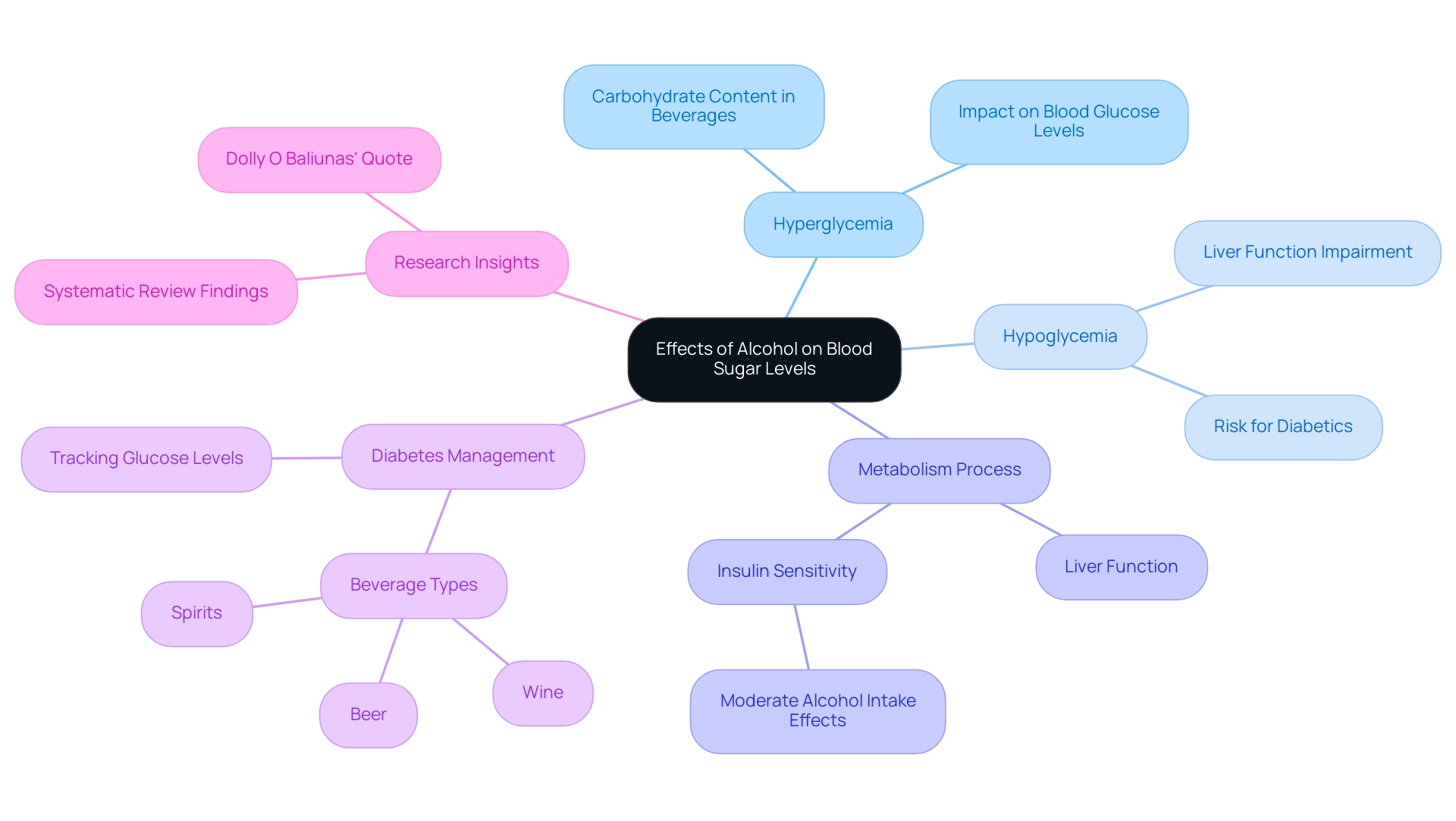
Safe Drinking Guidelines for Diabetics: What to Choose and What to Avoid
As part of T2D Solutions, a new resource hub dedicated to Type 2 and Type 3 diabetes education and community support, individuals with diabetes must adhere to specific guidelines regarding beverage consumption to manage their health effectively. Over a quarter of all deaths in the 15 to 20 age group are attributable to alcohol, emphasizing the seriousness of responsible drinking. It is advisable to choose beverages that are lower in sweeteners and carbohydrates, as alcohol diabetics can drink options such as dry wines or spirits mixed with zero-calorie mixers.
On the other hand, sweet wines, flavored liquors, and sugary cocktails are not among the alcohol diabetics can drink, as they can lead to significant spikes in blood glucose. Moderation is a crucial aspect of responsible drinking; men are advised to limit their intake to a maximum of two drinks per day, while women should restrict themselves to one drink per day, especially considering what alcohol diabetics can drink. Researchers have long suspected that women may experience worse substance-related harm than men due to differences in body composition and metabolism, making it essential for women to be particularly cautious.
Furthermore, consuming food while drinking alcohol diabetics can drink is essential, as it helps stabilize blood glucose levels and mitigates the risk of hypoglycemia. Consistent observation of blood sugar levels prior to, during, and following the intake of various drinks can yield important information on how different beverages influence personal glycemic responses, thereby aiding in improved management of blood sugar. T2D Solutions will provide customized resources, including guidelines and support materials, to assist individuals in navigating beverage intake safely while managing their condition.
A systematic review of 20 cohort studies found a U-shaped relationship indicating that moderate beverage intake can reduce the risk of type 2 health issues, with specific protective levels identified for men (22 g/day) and women (24 g/day), reinforcing the importance of moderation. For more insights and support on managing blood sugar levels, subscribe to T2D Solutions to stay updated on our upcoming resources, including expert articles, community discussions, and personalized support tools.
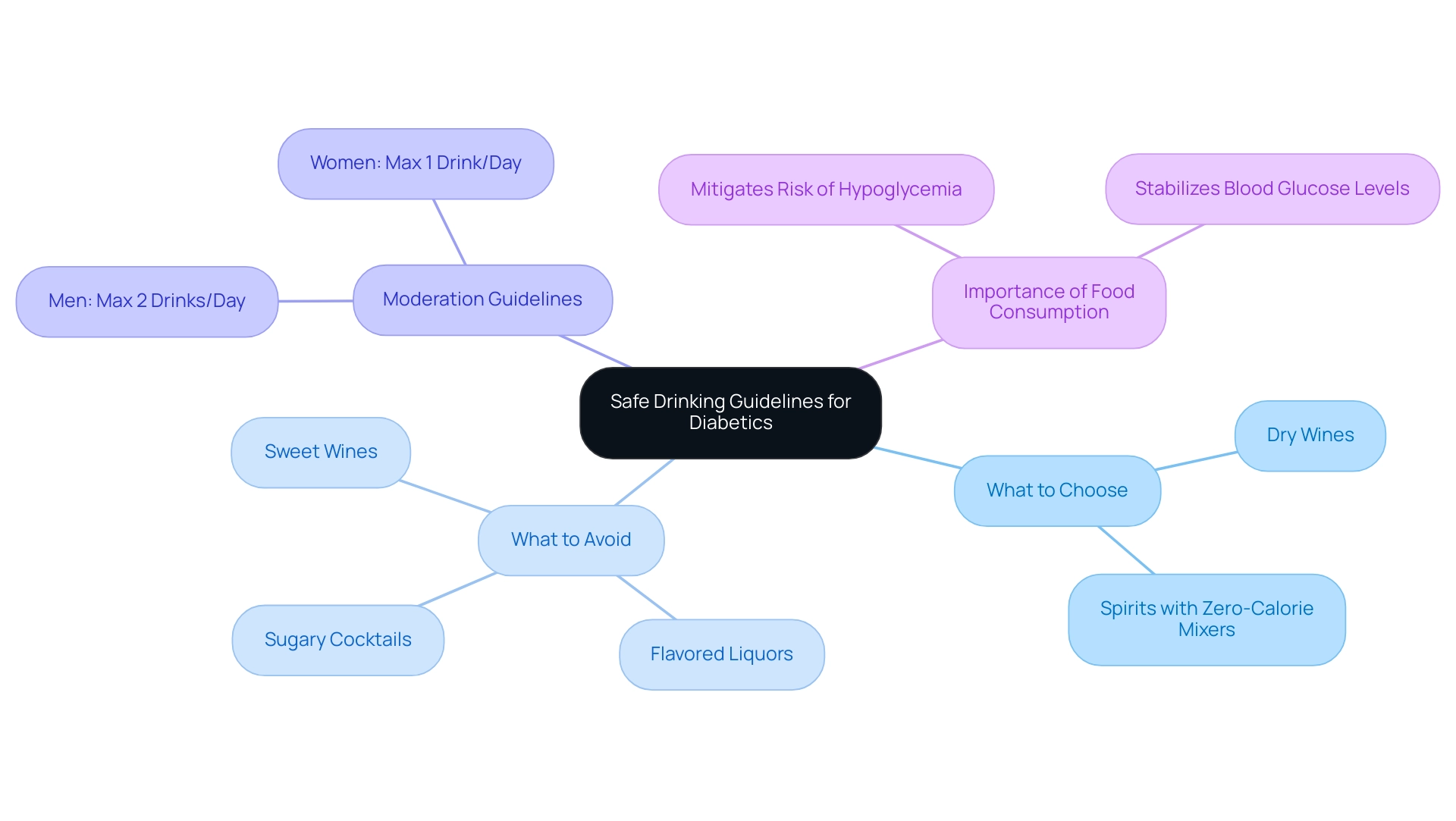
Alcohol and Diabetes Medications: What You Need to Know
For individuals recently diagnosed with a metabolic disorder who are undergoing medication therapy, understanding the interactions between spirits and prescribed medications is crucial. The types of alcohol diabetics can drink may enhance the effects of insulin and different medications for blood sugar management, potentially resulting in hypoglycemia, a condition marked by dangerously low blood sugar levels. Recent discoveries suggest that moderate intake of spirits, a type of alcohol diabetics can drink, specifically between 10–14 g/day, is associated with an 18% decrease in risks related to managing blood sugar levels.
At T2DSolutions, we promote individuals with blood sugar issues to participate in conversations with their healthcare providers to evaluate their specific medications and examine the risks linked to beverage consumption. Our platform seeks to offer extensive resources, such as articles and expert guidance, that emphasize the significance of moderating beverage intake while discouraging excessive drinking due to potential health risks. Moreover, certain medications for blood sugar management may have contraindications related to drinking, making it crucial to comprehend these interactions to avoid negative health effects.
T2DSolutions offers tools and support for newly diagnosed patients to navigate these complexities. As Dr. Yvonne Bonomo from St Vincent's Hospital Melbourne emphasizes, a clear understanding of these interactions can significantly influence blood sugar management and patient safety.
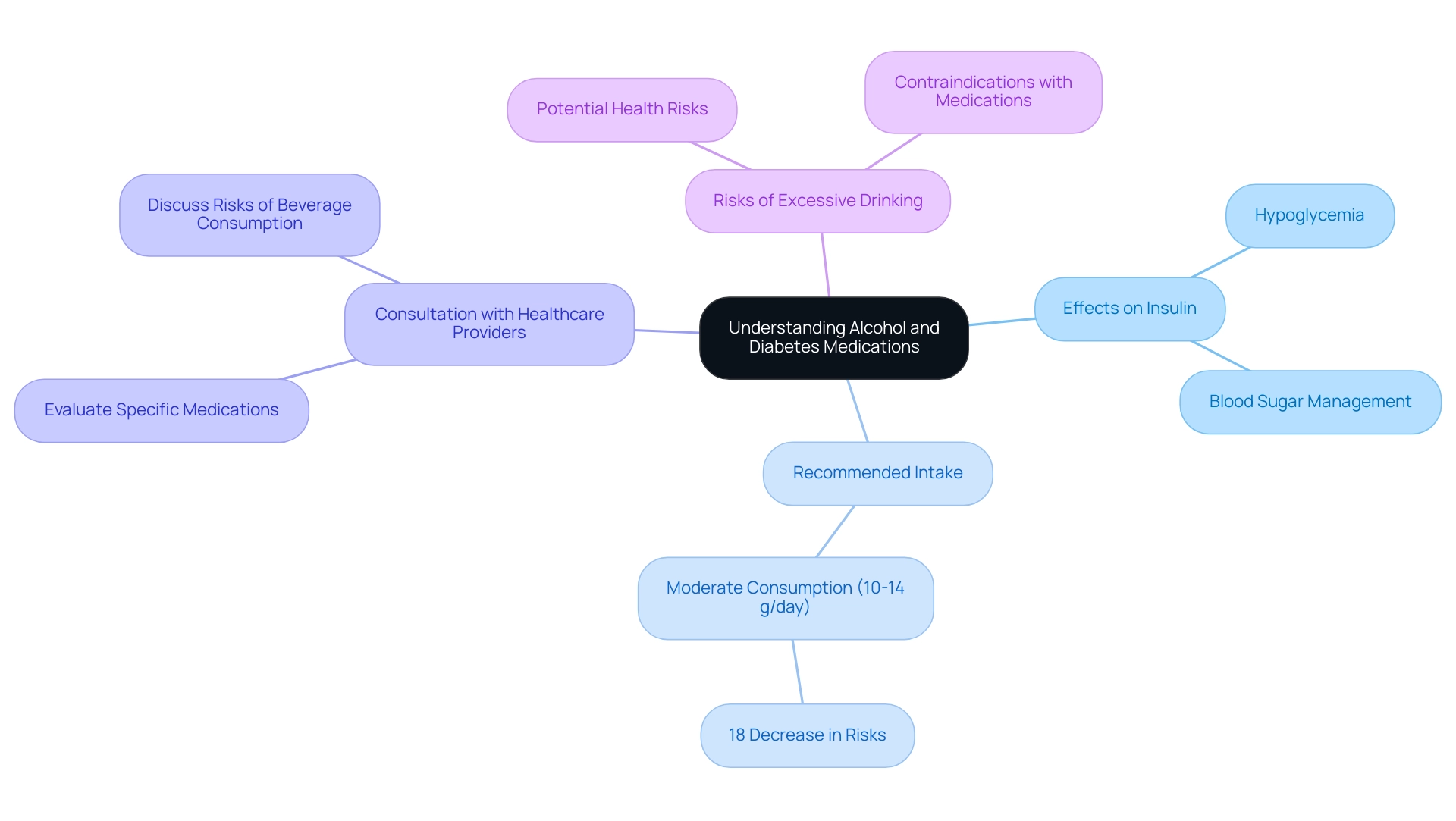
Choosing the Right Alcoholic Beverages: A Comprehensive List
As T2DSolutions introduces a new resource center for individuals managing their health, it is crucial to comprehend which alcohol diabetics can drink and how it can influence blood glucose levels. When choosing alcoholic drinks, individuals managing diabetes should focus on selecting alcohol diabetics can drink, which are low in sweetness and carbohydrates to maintain stable blood glucose levels. For example, dry wines, whether red or white, are typically low in sweetness and are considered alcohol diabetics can drink with minimal impact on glucose levels.
Light beers are a favorable choice for alcohol diabetics can drink, as they typically contain fewer carbohydrates compared to regular varieties. In fact, according to Randy P. Lacomb, on any given day, both men and women drink an average of slightly more than 4 cups of plain water and over 1 cup each of coffee and regular soft/other drinks, highlighting the importance of mindful beverage selection. Furthermore, clear beverages like vodka, gin, and tequila are examples of alcohol diabetics can drink, as they provide versatility and can be enjoyed with calorie-free mixers, such as soda water or diet tonic, offering flavorful alternatives without extra sweetness.
Champagne and sparkling wines are viable alternatives and types of alcohol diabetics can drink, usually containing lower sweetness levels when consumed in moderation. Conversely, it is crucial to avoid certain beverages, including those that alcohol diabetics can drink, as they can significantly affect blood glucose levels. Sweet wines, flavored liquors, and cocktails made with sugary mixers are not the types of alcohol diabetics can drink, as they can lead to rapid spikes in glucose.
A notable case study highlights the carbohydrate content in popular liqueurs, which are often sweetened spirits with high concentrations—Baileys Irish Cream contains approximately 20g of carbohydrates per 100ml, while Amaretto and Kahlua contain around 24g and 39g, respectively. Despite the high sweetness level per 100ml, serving sizes in cocktails may differ, emphasizing the need for careful selection. Staying informed about the carbohydrate content variations among different brands is crucial, as these figures can change; therefore, checking labels for accurate information is highly recommended to make the best choices for managing blood glucose levels.
Furthermore, understanding the reasons behind the rising popularity of non-alcoholic beer in the Netherlands from 2018 to 2022 can provide additional insights into healthier beverage choices for individuals controlling their blood sugar.
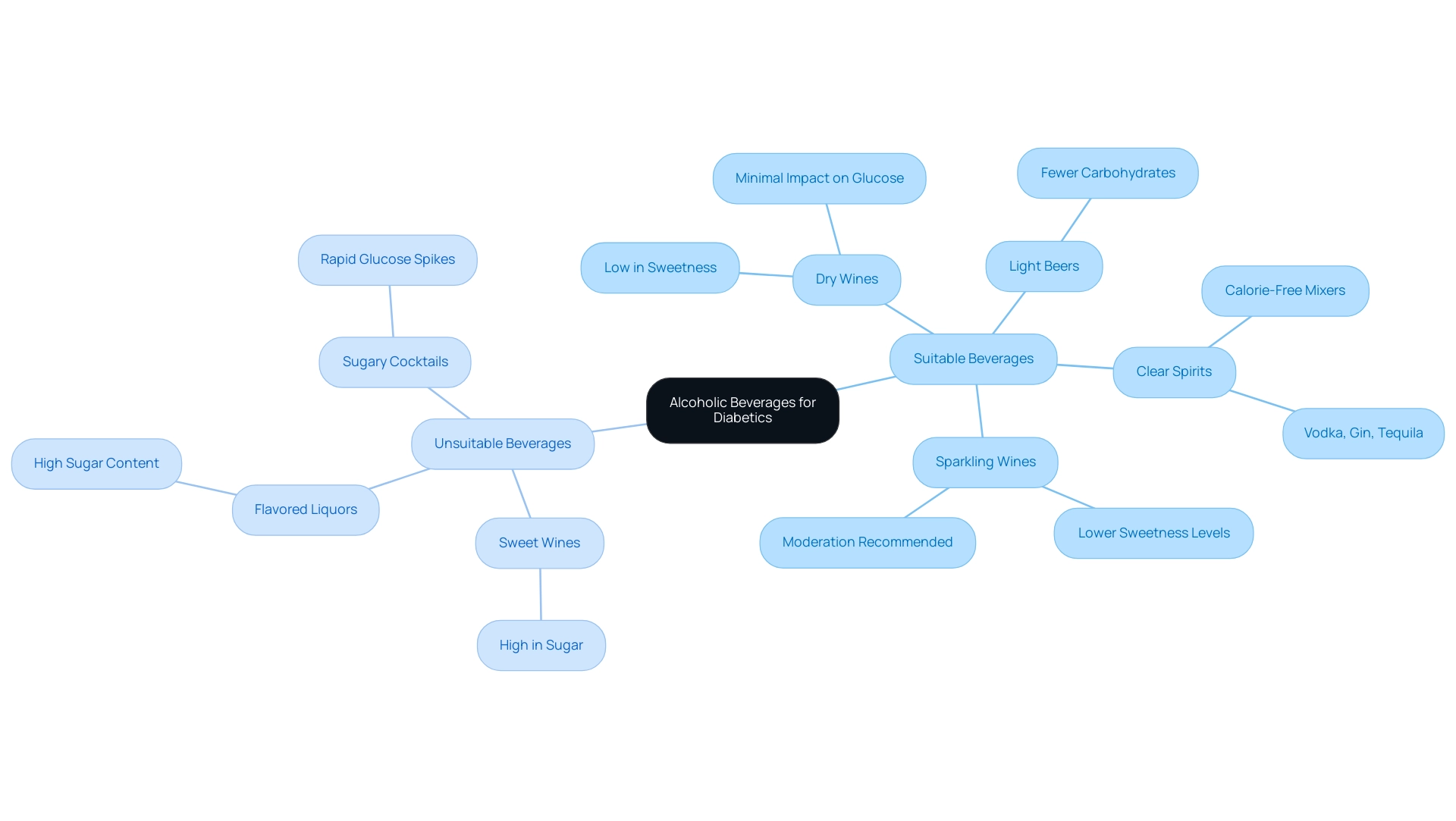
Monitoring Blood Sugar: Best Practices Before and After Drinking
For individuals managing diabetes, tracking blood glucose levels is essential, especially when considering the alcohol diabetics can drink. Establishing a baseline is essential, and it is advisable to check blood sugar before determining what alcohol diabetics can drink. Following alcohol consumption, it is important to monitor which alcohol diabetics can drink at regular intervals—ideally every hour for several hours—to evaluate the body's response.
It's noteworthy that only 5% of individuals seen solely in primary care were continuous glucose monitor (CGM) users, compared to 23.1% in endocrinology visits and 25.3% for those with both visit types. This statistic emphasizes the significance of utilizing CGMs for effective management of blood sugar. Maintaining a comprehensive record of blood glucose readings aids in recognizing patterns and can guide future drinking choices, including the types of alcohol diabetics can drink.
Furthermore, having fast-acting carbohydrates readily available, such as glucose tablets or juice, is critical for addressing potential hypoglycemia. As Dr. Tom Elasy emphasizes, 'effective blood sugar management requires proactive strategies,' which is especially relevant given the estimated 38.1 million adults living with this condition in the U.S., and knowing what alcohol diabetics can drink enables individuals with this health issue to safely enjoy social occasions without compromising their well-being.
T2DSolutions is committed to offering extensive resources and assistance for those navigating the complexities of managing diabetes-related issues, including educational materials and community support.
We invite you to subscribe to stay updated on new content and resources that can help you make informed choices in your diabetes journey.
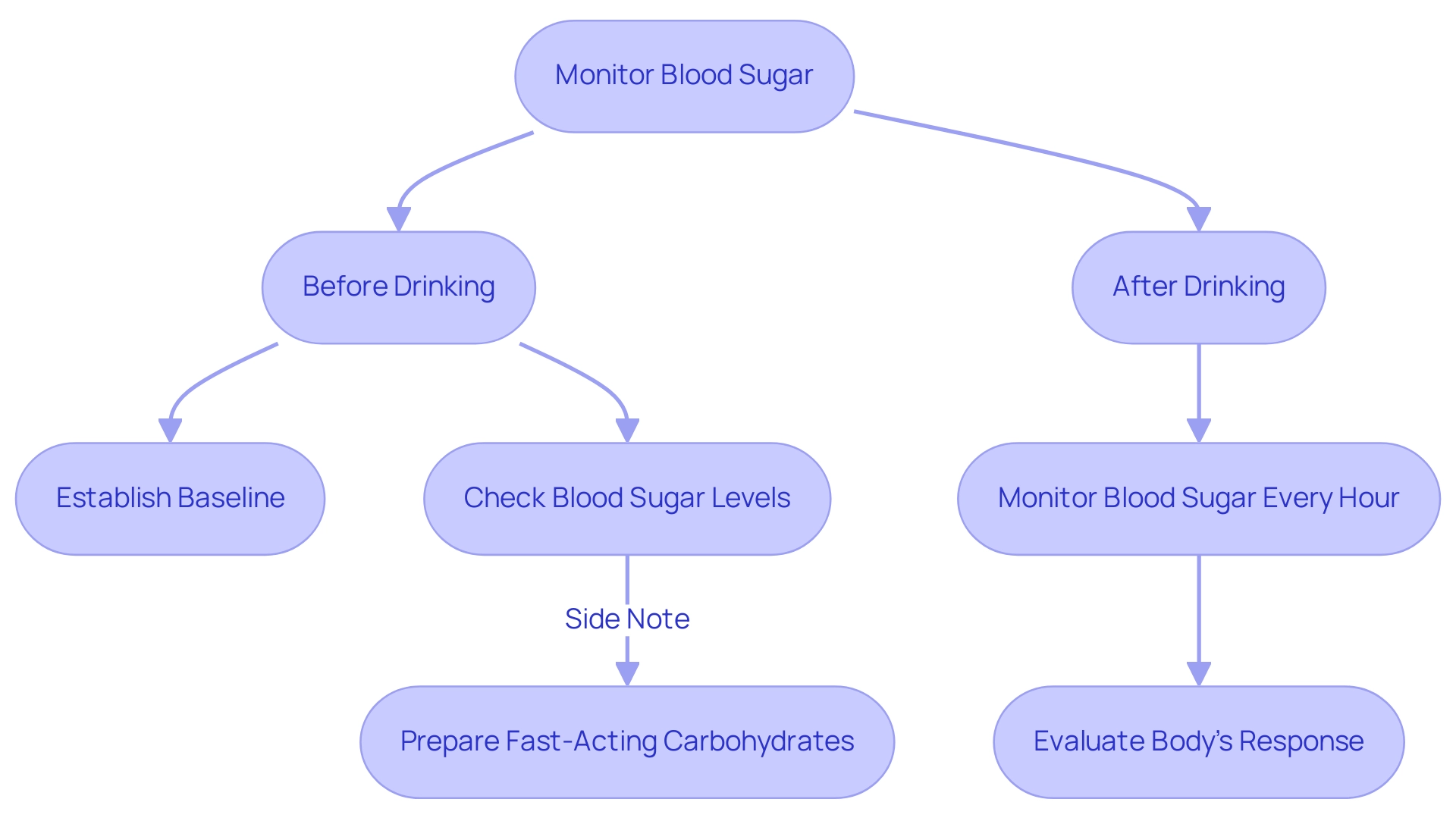
Conclusion
Understanding the effects of alcohol on blood sugar levels is crucial for individuals managing diabetes. Alcohol can cause both hyperglycemia and hypoglycemia, depending on various factors, including the type of beverage consumed. It is essential to recognize that not all alcoholic drinks affect blood sugar levels in the same way, and moderation is key. Safe drinking guidelines suggest opting for lower-sugar beverages, such as dry wines and clear spirits, while avoiding sweet wines and sugary cocktails that can lead to spikes in blood glucose.
Moreover, awareness of how alcohol interacts with diabetes medications is vital. Alcohol can enhance the effects of insulin and other medications, increasing the risk of hypoglycemia. Engaging with healthcare providers to understand these interactions ensures safer management of diabetes. Regular monitoring of blood sugar before, during, and after drinking is necessary to effectively gauge individual responses to alcohol and maintain stable glucose levels.
In conclusion, informed choices regarding alcohol consumption can significantly impact diabetes management. By adhering to safe drinking guidelines, understanding the effects of different beverages, and monitoring blood sugar levels diligently, individuals can navigate social situations while prioritizing their health. T2DSolutions offers essential resources and support for those aiming to make educated decisions about alcohol consumption in the context of diabetes, ultimately promoting a healthier lifestyle.



